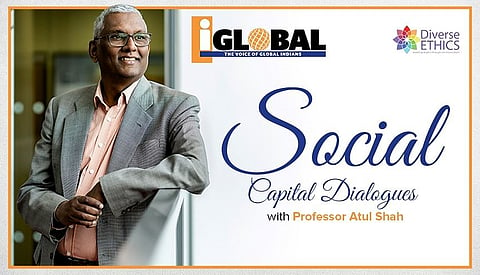

The new ‘Oxford Handbook of Religion and Economic Ethics’ is over 700 pages long, and comprehensively demonstrates that the world’s religions and cultures have a very different ethos when it comes to finance, trading, society, nature and commerce.
It is antithetical to the modern teaching of Economics which is obsessed by greed and materialism, markets and competition and against regulation and even government! As to the diversity of beliefs and values, they are ignored completely, and replaced by a universalist approach, where everyone is assumed to be selfish, materialistic and keen to maximise their personal gains. The new book is excellently edited by Professor Albino Barrera and Professor Roy Amore, and published by Oxford University Press.
Chapter 1 of the book is on Hindu Economic Ethics, by Vinod and Deodhar, and Chapter 2 is on Jain Economic Ethics by me. This indicates that my own research on Jain finance is seen as pioneering and relevant to the challenges of our time. For the first time, non-Abrahamic faiths are foregrounded and given prominence in a truly international book. Its authoritative focus and message shows that the Dharmic traditions of India have a lot to offer the world today – India is not just a booming economy, but there is a science and rationale behind its entrepreneurial spirit and dynamism.
The book covers many faiths and belief systems, from Islam to Judaism, Christianity, Buddhist, Sikh, Daoist, Confucian and indigenous traditions like Native American, Aboriginal and Shinto too. The chapters cover a vast diversity of beliefs around money and commerce, and a range of cultures and practices, including charitable institutions influenced by the religions which have a significant economic and social impact. In this sense it is such an important counter to modern economics textbooks which are full of equations and graphs, without any cultural or ethical analysis whatsoever. Abstract terms like interest rates, exchange rates, inflation and derivative securities populate books on finance, completely missing the real and experiential influence of money on everyday life. Economics ignores how different people and communities have varying customs and practices around commerce, land and animals, depending on their upbringing and traditions.
MORE LIKE THIS…
In the concluding chapter, the editor’s note ‘Religion and economic life have a symbiotic relationship. Each has something to give to the other to improve it. Religion and economic life mutually enrich each other. On the one hand, religion can transform socio-economic life, even market operations, to be much more efficient and effective. On the other hand, economic life provides believers with the opportunity not only to actualise their faith, but also to deepen their grasp of it and form truly vibrant faith communities.’ Be careful to ensure that future generations are not indoctrinated by this dismal and damaging ‘science’.
Given our inequality, climate and social crises and upheavals, we urgently need to engage with ethical and cultural matters, and transform human society from an aggressive, arrogant and expropriative mindset to a kinder, caring and compassionate perspective towards all living beings. This latest book is a reminder, guide and resource of diverse wisdoms of the world, and how often they have similar beliefs which are hiding in plain sight. Whilst the perspectives may differ, there are many commonalities which can enrich our economic science, practices and institutions. Let all students bring such themes into their classrooms, and may teachers and lecturers be inspired to bring them into the curriculum, not as special subjects, but as part of normal economic analyses. It is indeed a very prescient and pioneering book – I recommend it.
MORE LIKE THIS…
Professor Atul K. Shah [@atulkshah] teaches and writes about Indian wisdom on business, culture and community at various UK universities and is a renowned international author, speaker and broadcaster.